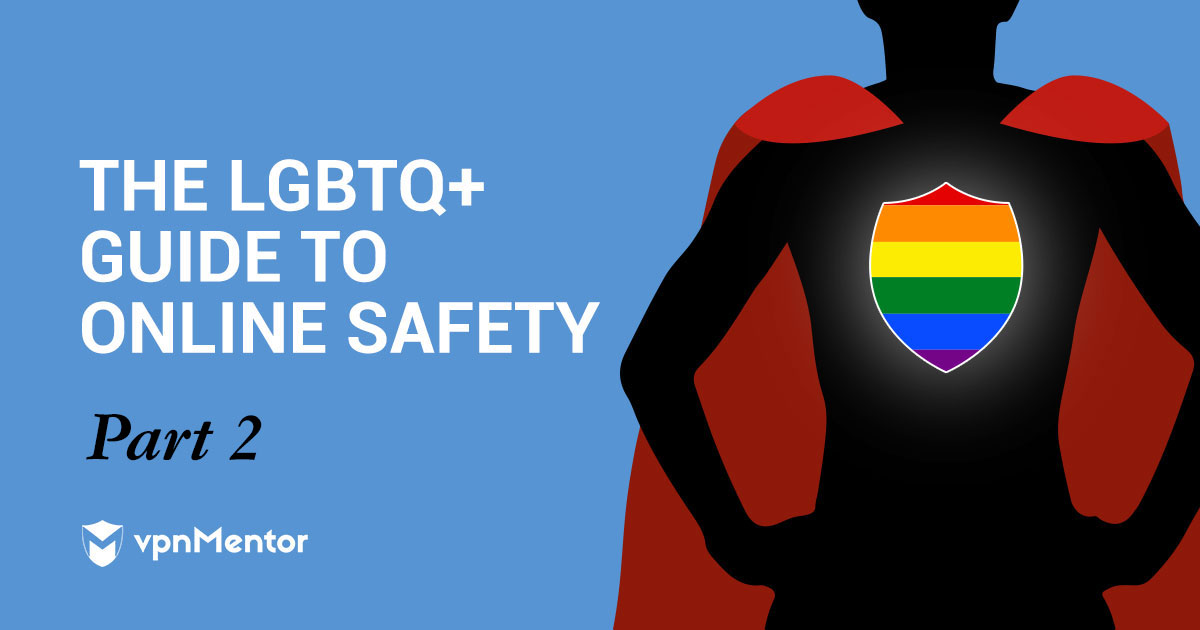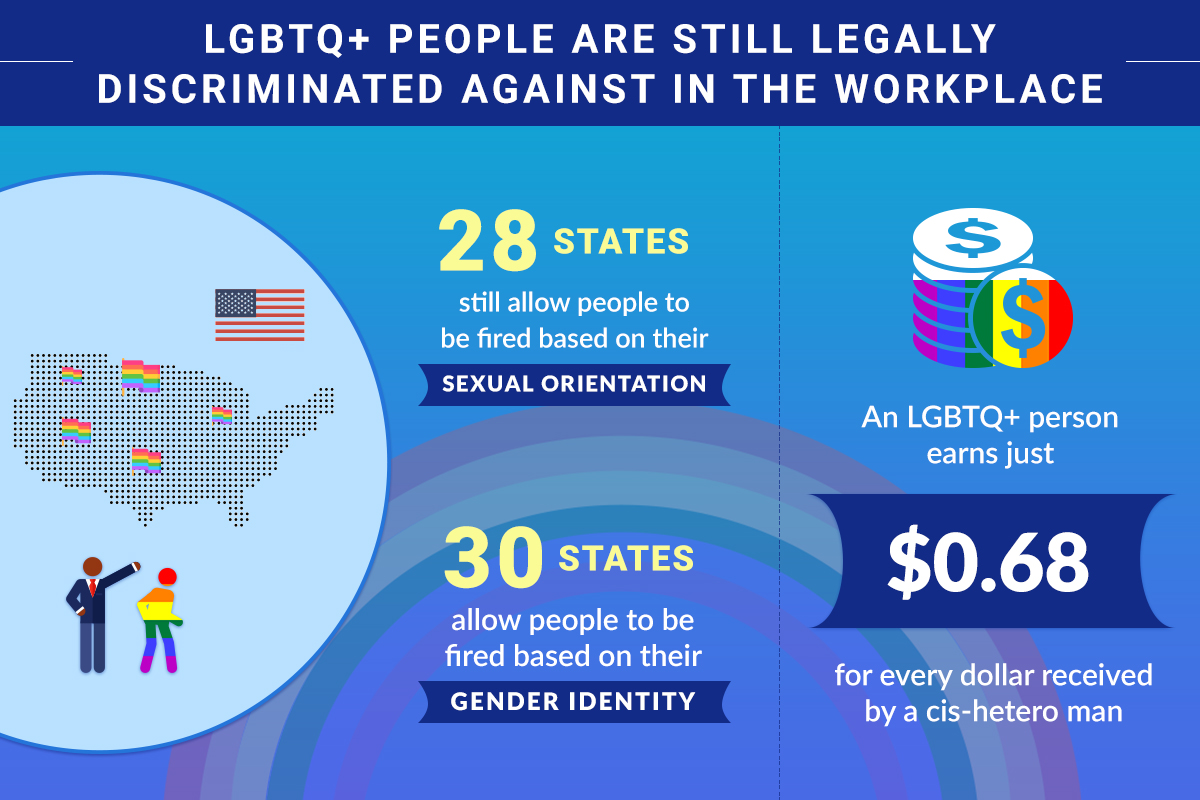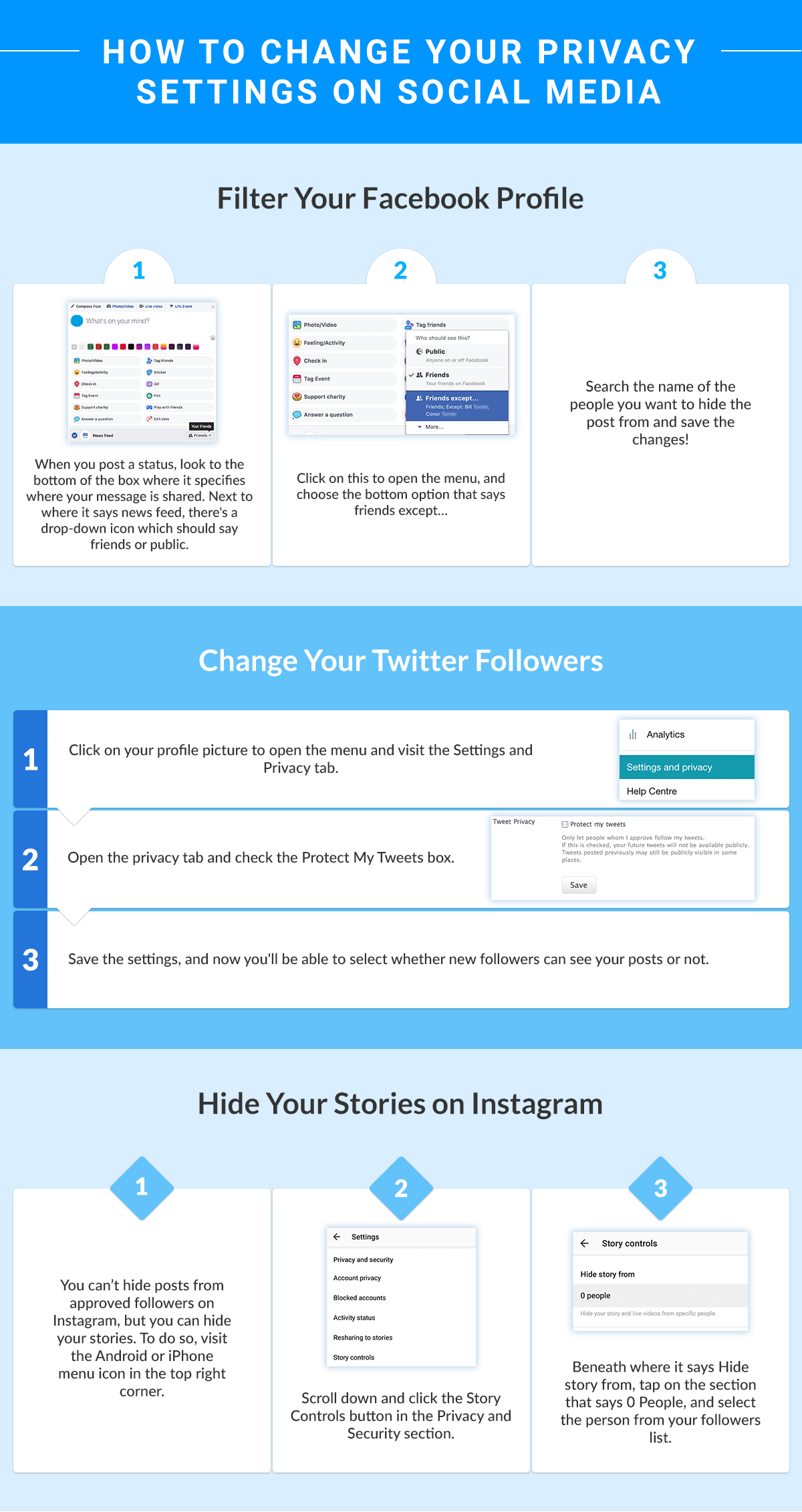LGBTQ+ guide to online safety — Part 2
Colin Stewart is a 45-year journalism veteran living in Southern…
How to avoid getting hacked. How to avoid unwanted advances. On the job while queer. A short guide for parents of queer kids. Those are the topics covered in Part 2 of this guide to online security.

The goal of this guide, compilied by the Internet security company vpnMonitor, is to provide practical strategies for coping with adversity, bigotry, and abuse on the web.
Part 1, published yesterday, covered:
- The scope of the problem
- Combating cyberbullying on social media
- Using privacy controls to avoid blackmail and harassment
- Dating while queer
Part 2, below, covers:
- How to avoid getting hacked
- Avoiding unwanted advances
- On the job while queer
- A short guide for parents of queer kids
PART 5: How to avoid getting hacked
How to Not Get Hacked
Unfortunately, it’s not just physical theft that could expose your private photos and information. Hackers are becoming incredibly sophisticated and can find your intimate information without you even knowing it.
The best way to protect yourself from hackers is to implement several layers of online protection.
- Install antivirus software that will alert you if you accidentally download spyware onto your phone. Spyware intercepts your files, passwords, and online activity, and transfers them back to the hacker.
- Only download apps from trusted users. Some unofficial apps are trojan horses for malware. If an infected program enters your phone, it can easily grant a third party access to your messages and photos.
- Regularly update your apps, since updates usually include patches and fixes for security flaws.
- Use two-factor authentication (2FA) on all your accounts to make it more difficult for cybercriminals to access your files via brute-force attacks. This setting requires an additional code from a third-party platform, like your SMS or email, so (unless someone has managed to hack into several of your accounts) they won’t be able to gain entry.
- Always use a VPN when using unsecured public WiFi networks. Open hotspots do not encrypt data, so other users can see and access your files. Rogue connection points also exist to intentionally farm your data. Using a VPN will encrypt your traffic and bypass this issue altogether. If you’re not sure which to use, here are some favorites.
PART 6: Avoiding unwanted advances
Avoiding Unwanted Advances
Unwanted sexual advances, from illicit photos to sexual requests, can happen to anyone. However, LGBTQ+ people often face specific perils.
For instance, if you’re trans, it’s not uncommon to be bombarded by intimate questions about your genitalia and sexual experiences, or be solicited for paid intercourse.
According to the survey, when comparing the experiences of people with different gender identities, transgender women felt the least safe online, and cisgender men felt the safest. It was also revealed that transgender people are frequently fetishized due to their gender. Many have the experience of being asked to expose themselves to their cis peers under the guise of learning about their transitions.
Dean, a transgender man recalls, “A high school classmate asked to see me naked so he could understand trans people… even after I told him to research on his own. Then he started making sexual advances.”
Similarly, lesbian couples might receive unwanted advances from straight men that have fetishized their relationships, and bi women are often perceived as being hypersexual and open to any sort of encounter.
“Usually it’ll be an ignorant ‘Want to be in a threesome?’ kind of sleazy comment,” said Priya, who’s bi.
Hannah, also a bisexual woman, noted the existence of ‘unicorn hunters,’ on platforms like Tinder. She defined them as “people who search for bi girls to have threesomes with,” and gave an example from her own experience:
“The one that stuck in my head the most was this email I got from a joint profile. They were looking for a girl to have a threesome [with], and I apparently checked all the boxes they were looking for. The email was really polite actually, asking if I’d be into it and if I’d want to meet up.”
However, she was acutely aware of the lack of social niceties and small talk before the offer, and it left her feeling slightly dehumanized.
It’s important to note that not all uncomfortable interactions rise to the level of harassment. Especially on dating sites, where many are looking for a hook-up, what might feel like crossing a boundary to one person could be a welcome proposition to another. If the interaction falls into that gray area, you’re going to have to make a call as to how to deal with it.
Also remember that it’s not your job to educate people if you don’t want to. While it’s true that some act from a place of ignorance, rather than malice, helping them see the light requires the type of emotional labor you don’t owe anyone.
With that in mind, here are some steps you can take for various scenarios in which you are made to feel uncomfortable:
- If you do choose to engage, inform the problematic person that they’re causing offense and explain how. Who knows, they might see the error in their ways and apologize for having crossed a line.
- If they’re being totally rude and unacceptable, but you still want to respond in some way, you can tell them that if they continue their behavior you’ll report them to the platform. Sometimes a simple threat is enough to make online trolls step down.
- If you’re not interested in a discussion, just block their account and report them to the platform through which you’re communicating.
- If harassment persists or escalates, and you fear for your safety, report them to the police. While the authorities often don’t adequately respond to online harassment, it may be worth a shot, and reporting an incident at least begins an official paper trail that may become useful down the road.
PART 7: On the job while queer
Navigating the Workplace While Queer
Despite growing visibility and acceptance, some LGBTQ people still face discrimination in the workplace.
In the US, in 28 states, it’s still legal to fire someone based on their sexual orientation, and termination due to gender identity is still allowed in 30 states.
“I’m worried my sexual identity being in the open could hurt my future career,” exclaimed Courtney, a bisexual woman.
These figures are truly shocking, but they highlight why it’s so important to know your rights.
Connecting with Colleagues on Social Media
By no means should anyone ever feel pressured to stay in the closet. That said, those who fear harassment or discrimination should know how to keep their personal and professional life separate if they so choose.
But what if a coworker friends you on Facebook or follows you on Instagram? Do you block them or ignore their request, potentially leading to an awkward work dynamic, or even confrontation?
If you do feel pressured into a friendship with anyone you’re not comfortable with, there are ways to filter what they see. Most platforms let you customize who can see each post, so you can vary the information you share with certain people. Here’s how to do this on popular social network sites:
Combating Harassment & Prejudice at Work
If you experience harassment or discrimination at work, it can be emotionally overwhelming. Especially with everything online nowadays, you might experience online harassment from your coworkers. However, that doesn’t mean you can’t get recourse. Here’s where to start:
- Document every relevant interaction and collect evidence to take to HR or your lawyer.
- Use your phone to record potentially problematic conversations, so you have first-hand proof of what happened.
- If any evidence exists within your work email correspondence, be sure to copy and paste or screenshot the content elsewhere – because your employer can delete or edit messages that exist within the company’s internal system. This applies to Slack or other online chat groups as well.
- Find someone you trust to help gather documentation. Having a witness will increase the credibility of your claims.
- If HR doesn’t take your accusations seriously, find a third-party you can contact to push the case further.
- Know your rights. Being able to refer to specific legislation and guidelines regarding discrimination will help you go to battle with confidence.

PART 8: A short guide for parents of queer kids
Tips for Parents of LGBTQ+ Youth
If you are the parent of an LGBTQ+ child, it’s essential to verse yourself in online safety.
Queer youth are especially vulnerable to abuse and depression, mostly because they have less of an ability than adults to organize their lives around finding a supportive community.
It is important to stay involved in your child’s life and be aware of their mental health. By maintaining an open dialogue and monitoring their online activity, you can help keep them safe.
Similarly, if you discover that your child is queer but has not disclosed that information to you, it is important that you do not confront them about it. Instead, have an open dialogue and incorporate statements about the LGBTQ community that will help your child feel safe.
Talk to them, but more importantly LISTEN. Ask what help they need and what tactics they’re using to protect themselves online. Many resources exist to support LGBTQ youth and their parents, so feel free to reach out and connect with others.
Below is a list of organizations that offer a plethora of resources for LGBTQ youth and their loved ones.
Support Organizations for LGBTQ+ Youth and Their Families
- It Gets Better: Created by married couple Dan Savage and Terry Miller, It Gets Better started as a social media campaign to provide hope for young LGBTQ+ people who face bullying and prejudice. Today it is an international media network with numerous partners.
- GLAAD: GLAAD was founded in response to the slanderous coverage of the 1980s AIDS epidemic. Today, it plays a major role in tackling problematic media narratives and encouraging essential conversation about LGBTQ+ issues.
- Born This Way: This foundation was created by Lady GaGa and her mother, following the success of the song of the same name. The organization aims to support and empower young people through research and by connecting them to mental health resources.
- FFLAG: Standing for Families and Friends of Lesbians and Gays, this registered nonprofit’s primary focus is supporting and sharing information with the friends and family of LGBTQ+ people. In addition to providing resources, they also connect members with local groups and contacts.
Helpful Blogs & Forums
You can also find an infinite number of blogs and forums that are used to discuss problems and share personal experiences. Popular blogs for LGBTQ+ youth and their parents include:
- Gay Christian Network Forum
- Transparenthood.net
- Parentingjeremy.com
- Raisingmyrainbow.com
Exploitive Relationships Among LQBTQ+ Youth
Studies show that LGBTQ+ youth are presented with more relevant risk factors than any other group of young people.
Often this occurs when children or youth come from homophobic/transphobic families that don’t give them the support they need and deserve. Young people who are forced to stay in the closet due to fears of backlash from their parents are particularly at risk of sexual extortion.
“When I was younger, and the internet more ruthless, I had a man threatening to come to my house to tell my parents unless I sent him pictures,” recounts Giselle, an asexual transgender woman. “I had [nowhere] to go and thought that some stranger was going to tell my parents everything.”
In extreme (though unfortunately not uncommon) cases, youth without familial support end up homeless and often are forced to turn to sex work as their only means of survival. According to Gil Fishhof, the Director of the Human Rights Youth Organization: “these kids are engaging in sex as a means of acquiring the basic necessities that we take for granted like food, clothing, and shelter.”
And even those who don’t engage in sex work can be vulnerable to exploitation from adults who seek to establish a ‘sugar daddy/mommy’ relationship with someone who is young and easily manipulated. In explaining some of the potential reasons why young people who identify as LGBTQ+ might fall into unsavory relationships, Fishhof says, “youth are less likely to say no in these situations because they feel like they need to validate their sexual identities. It creates a fertile ground for sexual assault.”
In these situations, the responsibility falls to parents and caregivers to keep a watchful eye on the young people they care about. It’s particularly important to keep an open dialogue about internet use and ensure that minors stay away from the adult dating community.
The following are all 18+ apps that those who are underage shouldn’t be on:
- Tindr
- Grindr
- Zoosk
- HER
- Hotornot
- Badoo
- Skout
If your child or a young person you care about is using one of these apps, have a conversation with them, and make sure they understand the risks of getting intimate with adults.
That said, while open and honest dialogue is always the best option for teaching your child about safety, if you think it necessary and have the ability to do so, you could also block their usage of these apps entirely.
One way to do this is by using parental control software.
These let you block apps, as well as track activity and messages. They can be as intrusive or unobtrusive as you want them to be, so you can find the balance between respecting your child’s privacy and keeping them safe.
The following are all highly-rated parental control programs:
- Norton Family Premier: Available by itself or as an extension to the Norton Security Suite, this control app allows you to set ‘house rules’ for each device. These can determine time limits, app restrictions and under 18 filters.
- FamilyTime: FamilyTime is available on most operating systems and allows you to monitor and manage your kid’s web use – giving you access to phone logs and location, and letting you block apps and implement geofencing.
- Qustodio: This option allows you to set individual time limits for each app, or block them completely. It’s also simple to monitor your child’s texts and calls through the admin panel.
- Net Nanny: Net Nanny is an award-winning software that offers real-time analytics, and that monitors activity and prevents users from accessing age-inappropriate content.
- Pumpic: Targeting mobiles specifically, Pumpic gives you remote access to your child’s device, and the ability to block or moderate the content they see. It provides logs of their activity, calendar, contacts, and messages.
In conclusion, vpnMentor stated:
We Hope This Helped
In a perfect world, LGBTQ+ people wouldn’t face a heightened risk online and would be free to express themselves however they wish. Sadly, social norms aren’t changing fast enough, and we still have a long way to go before that reality is realized. Unfortunately, this means that LGBTQ+ people have to be extra careful, especially online.
We hope our guide helps you take control of interactions online and makes you feel safer, while at the same time empowering you to fully enjoy the digital aspects of your personal, intimate, and professional life.





Commentary: Cutting off USAID is like unplugging life support